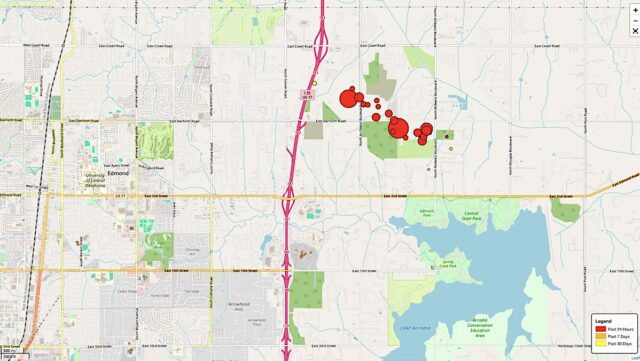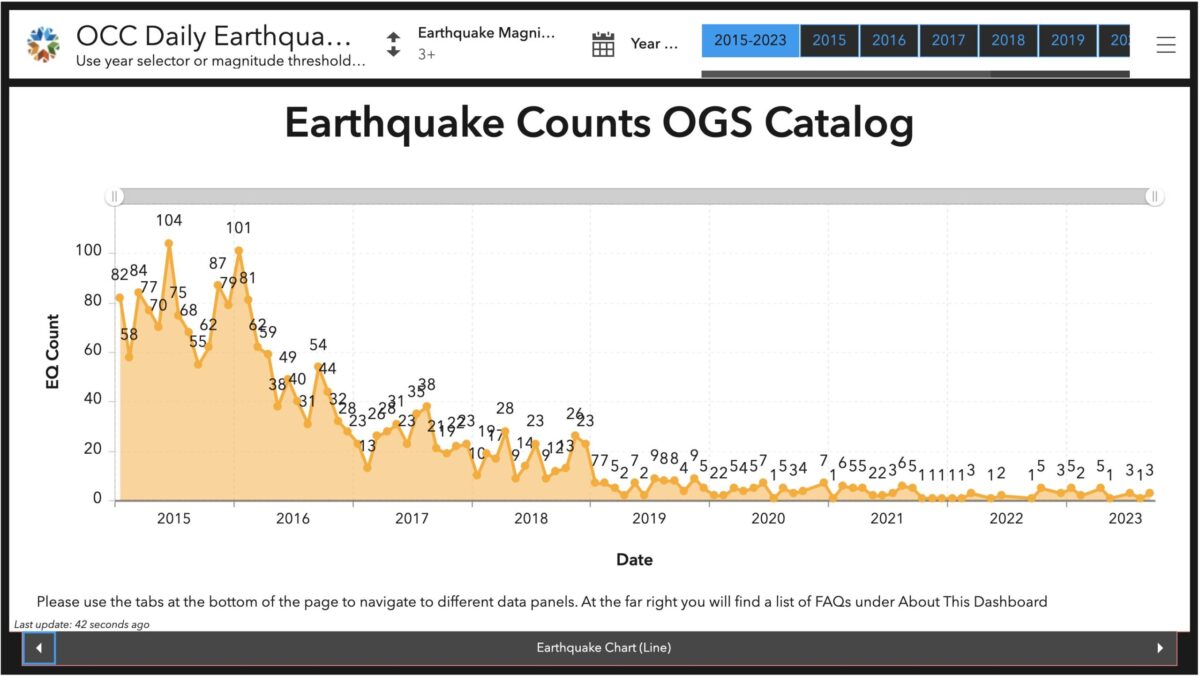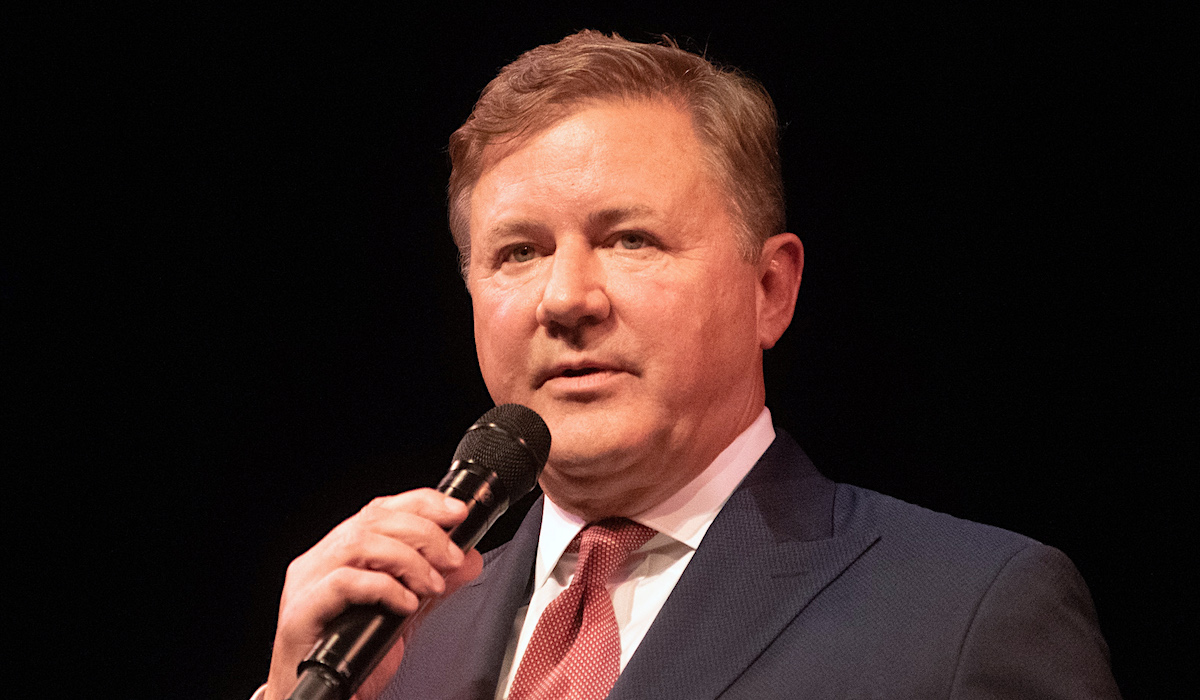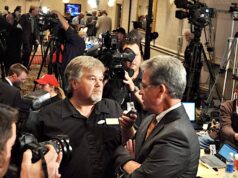
Several earthquakes struck Edmond and shook surrounding communities Friday night into early Saturday morning, with a pair registering magnitudes above 4.0 and marking some of the state’s most prominent tremors since a surge in seismic events last decade triggered controversial litigation.
The first trio of quakes hit between 9:37 p.m. and 10:04 p.m. Friday, with Oklahoma Geological Survey data eventually gauging their magnitudes as 3.2, 4.3 and 2.5.
At 4:43 a.m. Saturday, another 2.6 quake occurred, and at 5:36 a.m. the ground twerked again for a 4.1 seismic shake. At 6:55 a.m., the OGS registered another 2.7 magnitude earthquake. Several other aftershocks registered at lower levels near a fault line spanning the Arcadia area, and Oklahomans took to social media to share their rattling experiences.
“Did anyone else hear a loud boom and (feel their) house shake?” a woman wrote in the All Things Edmond group on Facebook around 9:40 p.m.
Within 40 minutes, more than 800 comments had been made on the post. There and in other posts, people expressed shock, frustration and sometimes a sense of humor.
“All the Californians that moved here are finally feeling at home,” one man wrote.
Bill Begley, Edmond’s marketing and public relations manager, released a statement Saturday saying the city is “inspecting facilities and infrastructure.”
“We are in contact with state officials investigating the occurrences, as well as the Corps of Engineers, who will inspect the dam at Arcadia Lake for impacts,” Begley said. “All new water and wastewater infrastructure in place as part of the city’s on-going water infrastructure improvements — including water towers — are built to structurally handle the seismic activity, but will be inspected to ensure their integrity and ability to continue to deliver safe, clean water to Edmond residents.”
He said damage appeared to be minimal after early assessments.
“Currently, police and fire report no incidents of safety or property impacts, but residents are encouraged to inspect their homes and structures for impacts and ensure they are safe,” he said.
Similarly, Oklahoma Department of Transportation spokeswoman Brenda Perry Clark said no state highway or turnpike infrastructure was affected by the Edmond earthquakes, noting that the agency receives automated notifications from OGS based on local geology, magnitude and bridge condition.
“These quakes did not reach those thresholds that require further inspection,” she said.
OCC: No fracking, wastewater disposal in area ‘for years’

According to the Oklahoma Geological Survey’s interactive map, the earthquakes occurred in a largely rural area of northeast Edmond, west of Arcadia.
The cluster of earthquake epicenters dotted areas around the intersections of East Danforth Road and North Air Depot Boulevard and North Midwest Boulevard, east of Interstate 35. The area includes the Hidden Lake and Hidden Creek neighborhoods, as well as Edmond’s Coffee Creek Wastewater Treatment Plant, which is undergoing a $171 million expansion project anticipated for completion in June.
State seismologist Jake Walter issued a statement on the OGS website early Saturday morning:
There has been activity along this fault in the last month starting on Dec. 29, with five events between M1.0-1.6 between Dec. 29 and Jan. 6. The seismicity from the last decade indicates there were three M4.0 or greater events in 2015 and 2017, corresponding to a time period when wastewater disposal volumes were higher.
Whereas most aftershocks are smaller than the mainshock, a very small fraction of aftershocks result in a larger earthquake than the main event. The seismic hazard remains high in the area. (…) We will continue to monitor the seismicity and provide assistance to the Oklahoma Corporation Commission, other state agencies and the public.
Walter’s statement referenced Oklahoma’s surge in significant earthquakes that began in 2011 amid increased underground disposal of wastewater derived from hydraulic fracturing of oil and gas wells.
At the time, Oklahoma’s sudden earthquake epidemic placed state agencies like the Oklahoma Geological Survey in precarious political positions with the petroleum industry and state leaders, who sought a solution to the shaking that would still allow for the “fracking” technique that was revolutionizing oil and gas exploration.
In 2017, the Oklahoma Corporation Commission created its Induced Seismicity Department with a mission “to closely monitor and regulate all oil and gas industry activities found to be correlated with seismic activity in Oklahoma.”
According to the agency’s website, earthquakes stemming from hydraulic fracturing exploration typically occur within “minutes to days following pressure pumping activities.” On the other hand, earthquakes caused by wastewater disposal after exploration often take “months to years for pressure perturbations to reach deep seated faults after initial disposal activities are commenced.”
“Researchers largely agree that wastewater injection into the Arbuckle formation, the state’s deepest formation, poses the largest potential risk for large-magnitude induced earthquakes in Oklahoma,” the Corporation Commission’s website states, citing a 2015 research paper.
Matt Skinner, OCC spokesman, told NonDoc on Saturday that this weekend’s Edmond earthquakes do not appear to be connected to current drilling or disposal activities.
“There hasn’t been deep-water disposal around that area in years. That was one of the first places we took action on in terms of stopping wastewater disposal into the Arbuckle, nor is there any hydraulic fracturing going on around there,” Skinner said. “In terms of quickly taking a look of what is out there, there isn’t anything. But the investigation continues.”
If seismic activity in the Edmond area continues and the Corporation Commission does determine it to be related to specific petroleum exploration or wastewaster disposal activities, Title 17, Section 52 of state statute grants the agency emergency powers to respond:
For purposes of immediately responding to emergency situations having potentially critical environmental or public safety impact and resulting from activities within its jurisdiction, the Corporation Commission may take whatever action is necessary, without notice and hearing, including without limitation the issuance or execution of administrative agreements by the Oil and Gas Conservation Division of the Corporation Commission, to promptly respond to the emergency.
“Since we started taking actions in 2015, the rate of magnitude 3.0 and larger quakes is down over 98 percent,” Skinner said.
Mike Hunter chose to ‘inject himself’ into earthquake lawsuits

Historically, some state leaders have involved themselves in questions about Oklahoma earthquakes, the most impactful of which have topped readings of 5.0 on the Moment Magnitude Scale, which replaced the historic Richter Scale in the 1970s.
From 2011 through 2018, when Oklahoma was experiencing dozens of significant earthquakes annually, several disputes between homeowners and their insurance companies ended up in court. Most notably, in 2021, Farmers Insurance agreed to a $25 million settlement with the state of Oklahoma regarding allegations that it improperly denied more than 1,000 claims related to earthquake damage.
Those allegations had spurred dozens of private lawsuits, and in 2020 then-Attorney General Mike Hunter injected his office into the proceedings with a July letter threatening potential criminal proceedings if the insurance company did not produce records it was fighting to keep sealed in private-party civil cases.
“I have reviewed recently filed lawsuits related to Farmers’ denial of earthquake claims in Oklahoma. We have concerns with business practices employed by Farmers to deny what appears to be (the) vast majority of all such claims,” Hunter wrote to Farmers Group CEO Jeffrey Dailey in California. “In an effort to further and fully investigate these concerns, we are requesting Farmers cooperate and voluntarily produce certain documents and testimony to this office which have been produced or provided in the following civil matters presently pending here in Oklahoma.”
Hunter concluded his letter with a threat to subpoena the company if it did not provide his office with documents, deposition recordings and a list of upcoming depositions in the litigation filed by Oklahoma residents.
“As the attorney general for the state of Oklahoma I am charged with protecting all Oklahomans from criminal violations of the law. The records requested herein are necessary for my office to fully investigate whether or not Farmers may have violated Oklahoma law,” Hunter wrote. “I trust Farmers will do its very best to cooperate with my investigation of these allegations. If, however, Farmers is unwilling to voluntarily cooperate and produce the documents and testimony requested, I have authorized my office to procure Farmers’ compliance through our subpoena power of Farmers, its counsel and opposing counsel involved in these actions.”
In November 2020, Hunter filed an “interested non-party” motion in a Farmers case that asked the court to lift a protective order and unseal discovery documents. He wrote that Farmers had not complied with his July request and that “the lifting of this court’s protective order and the resulting unsealing of documents or records covered by that order will promote judicial economy.”
Farmers’ attorneys criticized Hunter’s efforts to “inject himself into this civil lawsuit among private litigants” as “unnecessary and improper.” The motion was combined with other cases related to Farmers’ denial of earthquake-related claims, but Hunter requested continuance of a scheduled February hearing, which was granted for late April.
Before the hearing date arrived, Hunter and Oklahoma Insurance Commissioner Glen Mulready announced the settlement with Farmers that established a process for earthquake claims to be reviewed independently and a level of possible payments up to or even above $25 million. Other cases reportedly featured confidential settlements.
Follow @NonDocMedia on:
Facebook | X | Text or Email
Drummond: Hunter’s letter an ‘abuse of the office’

Nearly three years later, it’s unclear how many past earthquake claims have been re-evaluated or paid through the agreement. A search for “earthquake” on the Oklahoma Insurance Department website yields no results related to how citizens could apply for and seek access to the settlement funds.
But Hunter’s 2020 intervention in the private civil litigation raised eyebrows among lawyers and law enforcement.
At the time, Hunter had already faced criticism for his close connections to the Whitten Burrage law firm, which was involved in some of the Farmers litigation. Soon after he was appointed attorney general in 2017, Hunter had contracted with Whitten Burrage to sue pharmaceutical companies over their marketing of opioids. Hunter ultimately received large campaign donations from Reggie Whitten and Mike Burrage, who was simultaneously representing Hunter’s office on the opioid cases and representing the Choctaw Nation against the state’s position in cases about criminal jurisdiction and casino gaming compacts.
Hunter resigned in May 2021 amid questions about several of his actions, and Gov. Kevin Stitt appointed John O’Connor as his replacement. Gentner Drummond, who had narrowly lost to Hunter in a 2018 Republican runoff while emphasizing Hunter’s complicated relationship with Burrage and Whitten, defeated O’Connor in 2022 to become attorney general.
In February 2023, Drummond notified Whitten and Burrage that he was canceling their state contract. Attached to a scathing letter about their lucrative fees related to Oklahoma’s opioid litigation, Drummond referenced an article from the Wall Street Journal’s “Mansion” section highlighting Burrage’s 2022 purchase of three beachside condominiums in Fort Lauderdale, Florida, for $13.45 million.
“While your efforts under the contract have certainly succeeded in enriching yourselves far beyond what you deserve, those efforts have fallen far short of delivering the results that Oklahomans are entitled to receive,” Drummond wrote to the attorneys. “For instance, at the time your firm executed its agreement with then-Attorney General Mike Hunter, it did not include a cap on overall fees, unlike agreements for similar services between other states and their outside counsel. Subsequent addenda to the contract eventually provided for lower fees, and potentially an overall cap, but only after I criticized the arrangement publicly.”
In 2022, the Oklahoma Legislature passed a bill establishing contingency fee caps and other legal contract transparency requirements after NonDoc reported allegations that Hunter had asked House Speaker Charles McCall (R-Atoka) to stop the proposal while simultaneously encouraging the criminal investigation of McCall’s close friend, House Majority Whip Terry O’Donnell (R-Catoosa).
While Hunter had recused himself from the investigation, an Oklahoma County Grand Jury ultimately indicted O’Donnell anyway for a scheme to change state law and authorize his wife’s appointment as tag agent, but Drummond assumed control of the case in 2023 and dismissed it in April, saying “Terry’s guilty” but that he was “targeted.”
Burrage and Whitten responded to Drummond’s letter by saying their contingency contract was appropriate and that their fees were approved by courts.
“Our contract complied with Oklahoma law and we fully performed the services provided for in the contract,” they told Nolan Clay of The Oklahoman. “Courts have approved our fees multiple times and found them to be fair, reasonable and compliant with both the contract and Oklahoma law.”
On the same day he dismissed the O’Donnell charges, Drummond also spoke to NonDoc about the July 2020 earthquake litigation letter Hunter sent Farmers Insurance, on which he carbon copied Burrage and Whitten.
“It’s clear the weight of the attorney general was used in a threatening way to an insurance company to produce documents to a political ally,” Drummond said. “I would judge that as abuse of the office.”
Drummond called the Farmers saga “wrong” and described Burrage’s numerous and various dynamics with the Attorney General’s Office under Hunter as “ridiculous.”
“Just generally, the Office of the Attorney General should not use its power to threaten criminal prosecution in a civil matter to benefit a friend. I think it’s wrong,” Drummond said. “Mr. Burrage has gotten privileges of the AG’s office that no other human being should be given.”
Read Mike Hunter’s letter to Farmers Insurance attorneys
 Loading...
Loading...
Read Gentner Drummond’s letter to Mike Burrage, Reggie Whitten
